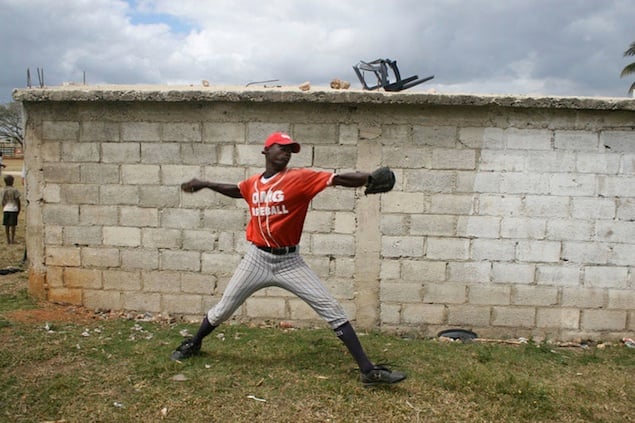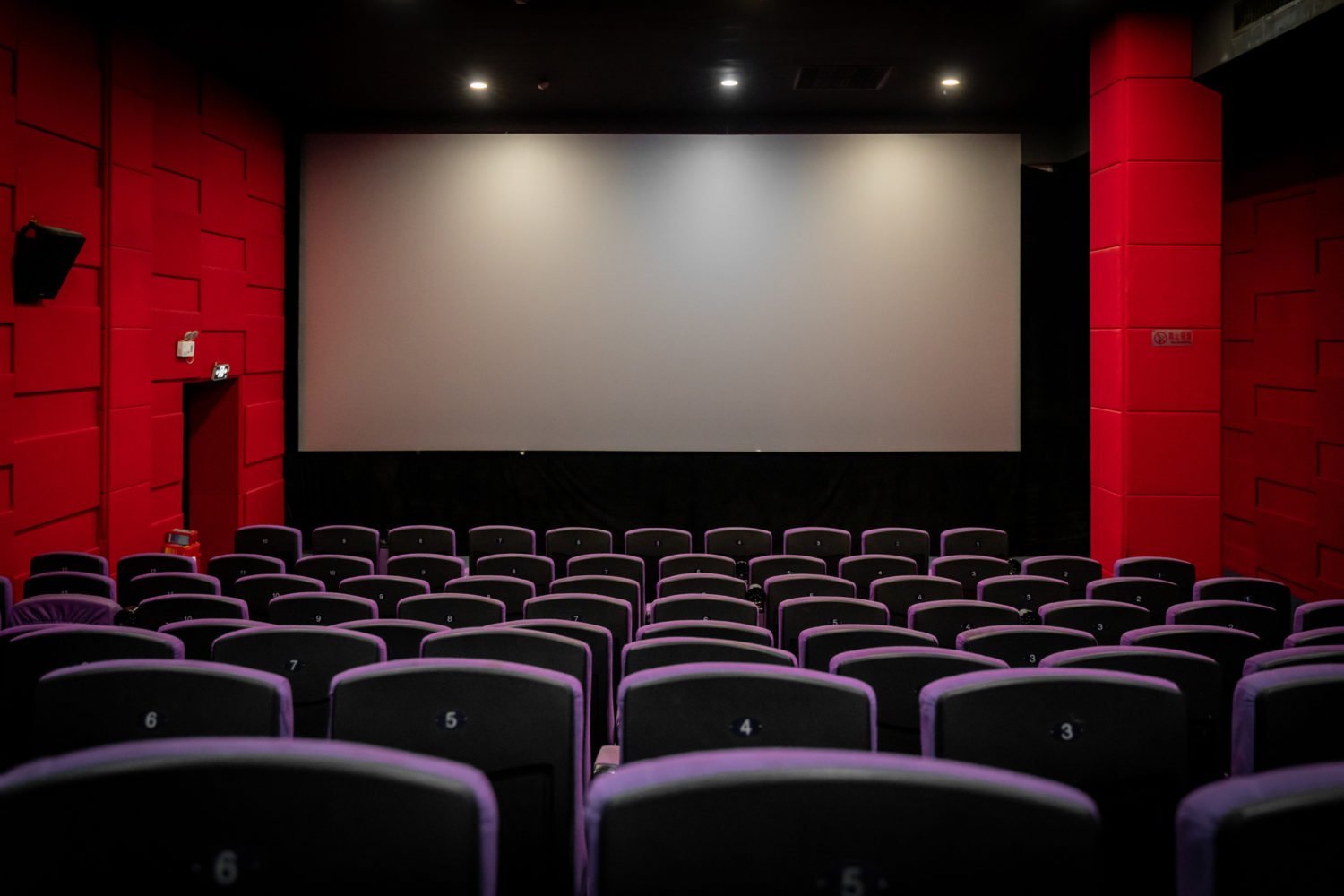When it comes to making a film about baseball,
Trevor Martin has the credentials in both categories. Martin, co-director of the damning new documentary
Ballplayer: Pelotero—playing at West End Cinema through July 26—is a DC native who played varsity baseball
at Woodrow Wilson High School, worked for many years in the Northwest DC Home Run
Baseball Camp, and also organized the city’s first-ever student film festival at the
Avalon in 2004.
Ballplayer examines Major League Baseball’s recruitment practices in the Dominican Republic,
a system that provides professional baseball with nearly 20 percent of its players.
It’s also a paradigm that’s deeply flawed, as the film demonstrates by focusing on
two young prospects in particular. Martin talked to
The Washingtonian about how the film was made, how MLB has responded to it, and what happens to the
kids who don’t make it over to the United States.
How did you all become aware of the Dominican recruitment system, and what made you
decide to make a film about it?
The film started out as a college project with my co-directors
Jon Paley and
Ross Finkel. Jon and I had a mutual friend in college named
Josh Wolf who introduced me to the project after he himself declined to travel to the DR in
favor of becoming a fancy-pants political operative. The way Jon likes to tell the
story is that he and Josh were big Orioles fans, which is a terrible thing to be.
As there was nothing to look forward to in the Big Leagues, they started paying more
attention to the Minor Leagues, discovering in the process that the Orioles farm system
was chock full of Latinos, most of them hailing from the DR. The idea initially was
simply to go down to the DR and investigate where these guys come from. How do they
go from playing stickball in the streets with rolled-up socks for baseballs to playing
under the lights of Major League stadiums? How is that process different from [the
one in] America, and what does it take to make it in the DR? Those were the central
questions behind
Ballplayer.
Usually when kids are faking their age to get into something, they’re pretending to
be older. That situation’s reversed in the film, as the emphasis is on being younger.
Why, for MLB, is a 17-year-old phenom worth less than a 16-year-old one?
The way they’ll tell it is that they need to sign Latin kids young because in their
eyes they need more time than American players to develop in the teams’ own systems
due to a mistrust of Dominican trainers, as well as the necessity to acclimate them
to life in the US through teaching them English, etc. In our experience, however,
the majority of kids who sign contracts with MLB clubs are signed after age 16 for
far less money. It seems that by creating a system whereby the 16-year-olds are paid
extraordinary sums—although consistently less compared to their American peers—it
enables MLB to devalue “older” (read: 17- to 20-year-old) players in the market. They
in turn sign droves of these “old” players for pennies on the dollar compared with
their 16-year-old counterparts, who through the draft are guaranteed sums significantly
higher. While I don’t have the exact numbers, in our experience while maybe three
to five 16-year-olds sign for seven-figure signing bonuses each year, hundreds of
“older” kids would be signed for sums in the five- or sometimes six-figure range.
At its core this system is designed to ensure a consistent pipeline of cheap Latin
talent destined for export to the United States. Now if you look at it from the perspective
of the kids lying about their ages—they’re not dumb, they know that the big money
is made when you’re 16, so, in the words of one trainer in the film, the system “gives
guys motivation to be 16. Because that’s when you get paid.”
There’s a lot of talk about the money and buying their parents out of poverty, and
most of the adults in the film seem to put massive amounts of pressure on the kids
to essentially be the saviors of their families. Did any of the kids ever express
any discomfort over being put in that position?
That is a very good question and certainly one we revisited consistently and in different
ways with the kids throughout the filming process. While I personally believe that
they must have felt enormous pressure, I don’t think either one of them ever said
they were uncomfortable with their role. That said, the more time you spent with them
and their families, the stakes were clearly established. I think our guys felt they
had a unique opportunity to make better lives for their families and consequently
would do their utmost to take advantage of it. Failure wasn’t ever something they
wanted to talk about, or even consider.
I didn’t see much evidence that anyone in the DR might feel that the entire system
(not just the age-verification process) might be flawed, in the way that it treats
these kids as commodities, as crops that are grown to be sold. Does that sentiment
exist there?
I think this is a really complex topic. Certainly in our experience we met numerous
prospects, trainers, agents, and families who felt taken advantage of or abused in
one way or the other through their experience in baseball. That said, they don’t have
a lot to compare it to. Outside of the professional baseball community there isn’t
a good understanding of how the American system works, and thus how unequally they’re
being treated in the DR. Within the professional baseball world, among the independent
trainers we encountered, [there’s] a pervasive reluctance to criticize the system
largely due to the fact that their entire business depended on the goodwill of MLB
and the franchises. You’re not going to bite the hand that feeds you, right? In my
personal opinion—and I’m not speaking for the rest of the team or for anyone else
associated with the project—accurately demonstrating how the system works and explaining
the motivations of its largest actors is enough evidence to damn elements of it in
the minds of many Americans.
How analogous to hanging one’s hopes on the lottery is banking on a kid managing to
make it to the majors? What percentage of these kids actually makes it out?
I think the lottery is a good analogy for this. I don’t want to purvey false statistics,
so I invite the readership here to do the math, but it’s our understanding that out
of approximately 100,000 Dominicans training full time to become baseball players,
only about 400 to 500 guys are signed per year. Then they get sent to the academies
where they are often combined with signees from all over Latin America. If a guy is
good enough to make it out of the academy, he’s sent to the United States and then
has a further four or five levels of play before the major leagues: rookie ball, low
A, high A, double A, and finally triple A. I think it’s fair to say the difficulty
of moving up increases exponentially as you get higher up the ladder, so while I don’t
have a tidy percentage for you, I can assure you it’s extremely small.
What happens to kids who’ve devoted the entirety of their childhoods to becoming pro
ballplayers but fail?
I think results vary, but in most cases, as it is generally kids from the most marginalized
of backgrounds who are sacrificing their educations to pursue baseball as a career
choice, they don’t have many options. The luckiest among them will work for baseball
teams as scouts or in some other professional capacity. Many others will become independent
trainers themselves and seek out other young children to train with the hopes of collecting
a cut of their signing bonuses. Others will seek careers outside of baseball. We met
some guys who became motorcycle taxi drivers, cooks, who work in hotels, cut cane,
or work in corner stores to get specific. Some guys use the English they pick up at
the baseball academies or from minor league ball in the states and try to work in
the tourism industry as English speaking guides and hosts. The sad fact is that many
are simply unemployed.
As you stated at the end, MLB wasn’t interested in participating in the film. Was
there difficulty in getting the academies themselves to participate?
You’re right, Major League Baseball repeatedly refused our requests to be interviewed
or to comment on this film. Then they formally issued a statement claiming they were
never contacted about it, which was completely spurious, as we have the e-mails to
prove it. MLB clearly thought that this was a film by a bunch of kids with no potential
for distribution—which it was . . . until it wasn’t—and so they brushed us off. However,
we also gave them an opportunity to respond to the film when distribution was far
more likely, but they again chose not to participate. Bizarrely, a few weeks before
our theatrical premiere,
Commissioner [Bud] Selig himself commented that he felt the film was “inaccurate.” Then he went on to say
he hadn’t actually watched it. We maintain that the movie is indeed an accurate representation
of how the Dominican system works and invite Mr. Selig or his representatives to watch
the film and specifically enumerate what they find to be inaccurate, as opposed to
issuing blanket statements aimed at discrediting a film they’re clearly discomfited
by.
What other roadblocks may have made the film difficult to get made?
Like any upstart documentarian will tell you, the biggest roadblock was financial.
We begged, borrowed, and stole (in the proverbial sense) all the production funds,
and after nine months of living in the DR we knew we had a great movie in the bag,
but we were broke. We spent the following year of our lives pitching it around to
various outlets and investors to no avail, and just when we were getting desperate,
through a mutual friend we were introduced to our executive producer,
Andrew Muscato, who serendipitously was just starting a sports documentary production company with
none other than
Bobby Valentine. Andrew had made a movie about Bobby when he was a coach in Japan called
The Zen of Bobby V, and I guess Bobby enjoyed the process so much he decided he wanted to make more
movies. To our delight, when we showed them the footage they were really excited by
it. Bobby has a strong connection to the Dominican Republic, having played there when
he was a professional, as well as having met his wife there. So, long story short,
they signed on to invest in the film, and we became the first documentary their new
company, Makuhari Media, has released.
What sort of response have you received to the film from hardcore baseball fans, or
from people who were perhaps once involved in MLB but aren’t anymore? In other words,
what’s the response been from people who are close to the game but aren’t restricted
from talking to you in the way that someone who’s officially part of the MLB might
be?
It’s actually been very gratifying to learn that for people I’ve spoken with who are
involved in the business of baseball in the DR, the film is something of a mirror;
people have tended to find their own truths in it. I think it’s telling—and maybe
I’m jinxing myself here—that not a single person involved in the film has accused
us of misrepresenting them. Even
Rene Gayo—the director of international scouting for the Pittsburgh Pirates, who is certainly
portrayed most critically—issued a statement claiming he was “guilty of doing what
his job description demanded.” From the independent trainers like
Astín Jacobo to the American agents like
Rob Plummer to the players themselves, people have embraced the movie and expressed their view
that this is what the system is like. It’s really only MLB as an institution that
has a problem with the movie, so I’ll just let you marinate on what that might mean.
Ballplayer: Pelotero
is playing at West End Cinema through July 26. For more information about the film,
visit peloterothemovie.com.


















